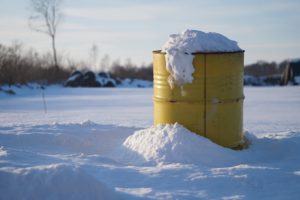 On November 1, 2005 the Government of the Northwest Territories (GNWT) began Canada’s most northerly recycling program. The goal of this arctic recycling program is to recover, reuse and recycle the more than 25 million beverage containers sold in the NWT each year. Until now, most of these containers have ended up in the garbage or as litter.The concept for the Beverage Container Recovery Program began in 2001 with a discussion paper which asked what waste recovery and recycling services residents expected the territorial government to offer. The concept of recycling met with overwhelming positive response, and input from the public and key stakeholders resulted in the Waste Reduction and Recovery Act being passed by the Legislative Assembly in October 2003. This Act’s fundamental principles are:
On November 1, 2005 the Government of the Northwest Territories (GNWT) began Canada’s most northerly recycling program. The goal of this arctic recycling program is to recover, reuse and recycle the more than 25 million beverage containers sold in the NWT each year. Until now, most of these containers have ended up in the garbage or as litter.The concept for the Beverage Container Recovery Program began in 2001 with a discussion paper which asked what waste recovery and recycling services residents expected the territorial government to offer. The concept of recycling met with overwhelming positive response, and input from the public and key stakeholders resulted in the Waste Reduction and Recovery Act being passed by the Legislative Assembly in October 2003. This Act’s fundamental principles are:
- Reduce, Reuse, Recycle – Reduce waste, reuse and recycle materials.
- Polluters Pay – Makers and consumers of materials pay to pay to prevent, control and fix pollution problems.
- Product Stewardship – Manufacturers of products are responsible from beginning to end, including disposal of those products.
- Universal Access – All NWT residents can participate.
The Waste Reduction and Recovery Act sets up a legislative framework for recovering different kinds of waste for reuse and recycling. The subsequent Beverage Container Regulations establish the program, enable community recovery depots and regional processing centres to be set up, and refundable deposits and non-refundable recovery fees to be collected.
The success of this arctic recycling program is evident in the initial month of operation with over 1.67 million empty containers being diverted from the waste stream. The program has had to overcome several major challenges including the large landmass of the NWT (the NWT covers 1.3 million square kilometres) and low population (43,000 people). There is one city of 21,000 (Yellowknife), and there are 32 other towns, villages, settlements, hamlets and charter communities. Many of these are only accessible by barge in the summer or ice road in the winter, making transportation logistics another major challenge.
Beverage containers were selected as the first waste type to include in the recovery system. All ready-to-serve drink containers (glass, plastic, aluminium, metals, waxed cardboard and tetra packs) are included, except for milk containers. The GNWT administers the program but all handling and processing of collected materials is done by private businesses or community organizations.
All Beverage distributors must be registered with the GNWT. These Distributors collect deposits and processing fees from their retailers and remit these surcharges to a special fund known as the Environment Fund. Consumers pay both a deposit and processing fee to the retailer upon purchase of the beverage product, and are refunded the full deposit when the container is returned to a designated depot. For example, the deposit and recovery fees on a beer can total 15 cents, with 10 cents of that refunded at the depot.
By the end of November 19 depots were licensed in communities representing more than 90% of the territories’ population. Three regional processing centres have been established in Yellowknife, Hay River and Inuvik. Depot operators collect, sort, and store empty containers until they can be shipped to a processing centre. With the NWT’s transportation challenges, many of these depots have to store empty containers for many months until a barge arrives or an ice road opens.
Containers recovered are recycled and reused as much as possible. The GNWT has entered into an agreement with Brewers’ Distributors Limited of Alberta that enables all refillable beer bottles to be transported to Brewers Distributors for reuse. Aluminum cans and plastic bottles are densified and transported to recycling markets in southern Canada. Local markets and uses for other materials are being developed. For example, non-refillable glass containers are crushed and used locally as a substitute for sand.
The three regional processing centres have been supplied with the following recycling equipment:
- Harmony Enterprises high density vertical balers for baling plastic bottles, cardboard and tetra pack containers.
- Densifiers for aluminum cans.
- Glass breakers for non-refillable glass bottles.
Public participation in the program has been very enthusiastic. By the end of November, Yellowknife’s depot and processor, The Bottle Shop, had collected over 900,000 empty beverage bottles and cans. Most of these materials will be baled or densified, or stored whole until full truckloads are ready for transport into southern reuse and recycling markets.
Over the next several years the GNWT will be looking at expanding the arctic recycling program to include other materials such as milk containers, cardboard, plastics, tires, and electronic wastes.
For more information about NWT’s Beverage Container Recovery Program or the Waste Reduction and Recovery Act contact:
Ms. Diep Duong, Solid Waste Specialist, Environmental Protection Service, GNWT
Phone: (867) 873-7654 Email: [email protected]
or
Emery Paquin, Director, Environmental Protection Service, GNWT
Phone: (867) 873-7654 Email: [email protected]
Submitted by:
Tom Button, Ecotainer Sales Inc.
Canadian Distributor for Harmony Enterprises Balers
Phone: (800) 561-6525 Email: [email protected]
